News
Independent Report indicts Zamfara, Kano Governors as major sponsors of recent nationwide protests
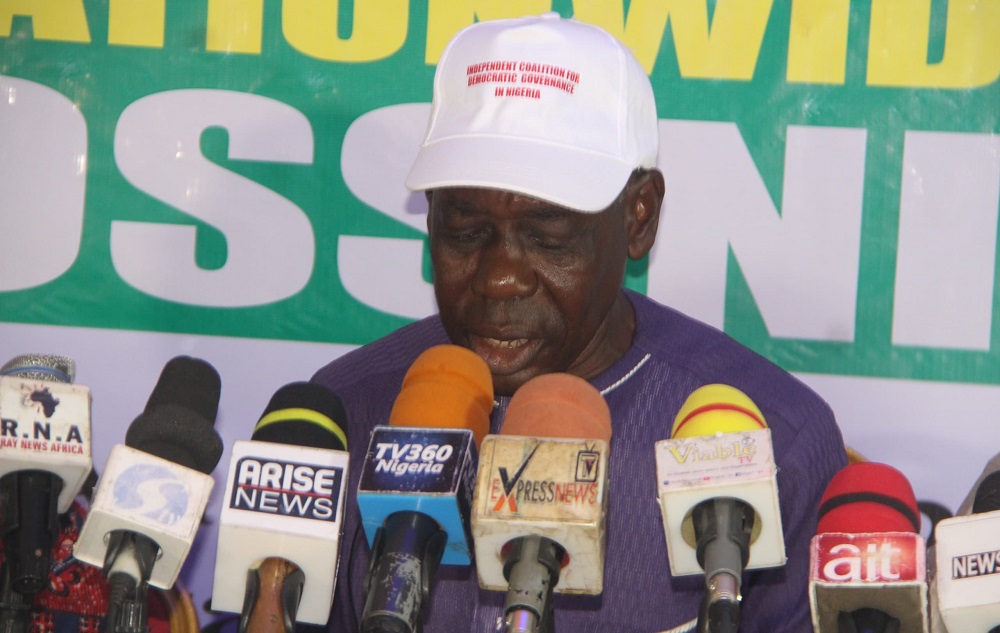
A recent independent report has indicted Governors Dauda Lawal and Abba Kabir Yusuf of Zamfara and Kano states as major sponsors of the recently held nationwide protests.
The report condemned the roles played by the two governors in escalating the protests into violent and destructive actions.
The report was released at a press briefing on Monday in Abuja, by the Independent Coalition for Democratic Governance in Nigeria, led by its convener, Dr Ben Omale Amodu.
According to the report, the governors of Zamfara and Kano states, both from the opposition Peoples Democratic Party (PDP), mobilised hoodlums to target political rivals, wreak havoc on public and private property, and loot valuables.
The report specifically highlights the destruction of the APC secretariat in Zamfara State, the vandalism and arson of the Nigeria Communications Commission (NCC) Industrial Park in Kano State, and the attempted arson of the residence of the immediate past governor of Zamfara State.
The report’s findings suggest that the protests, which began as a peaceful expression of discontent with the government’s economic policies, were hijacked by anti-democratic forces and opposition elements seeking to destabilize the government.
The actions of the Zamfara and Kano state governors have been widely condemned as a blatant attempt to exploit public unrest for personal and political gain.
The Independent Coalition for Democratic Governance in Nigeria called on the Federal Government to take decisive action to address the demands of the protesters, prevent future occurrences of such destructive protests, and hold accountable those responsible for the violence and destruction.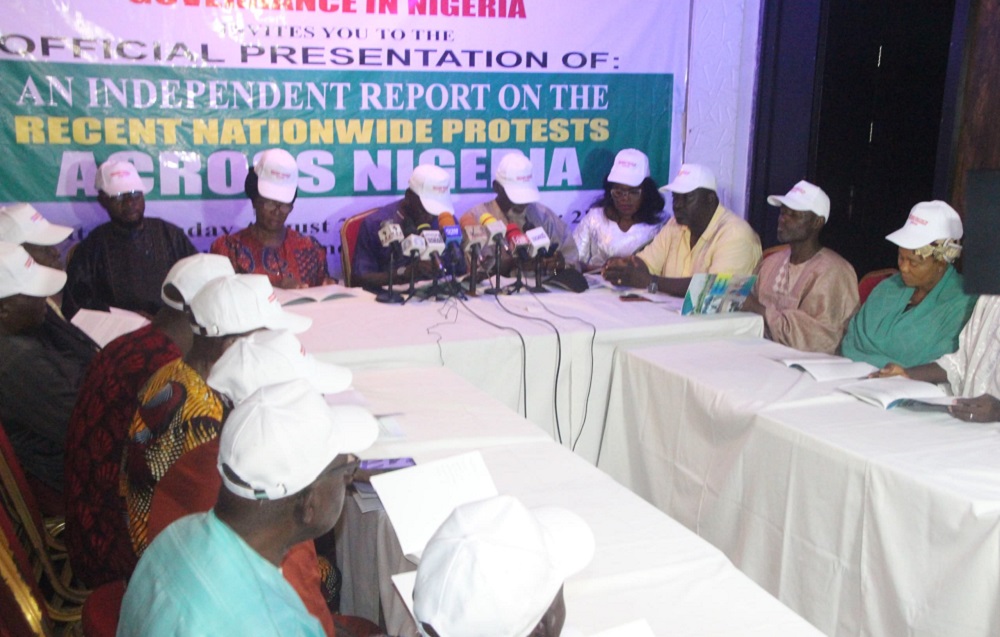
“It was noted that a significant number of the states with high incidences of hijacked protests were under the governance of opposition parties, notably the PDP and NNPP. Conversely, states with APC governors exhibited minimal to no records of violence, instead witnessing peaceful protest demonstrations as compared to the former,” the report said.
“In the case of Zamfara state, where insecurity has reached alarming levels, with numerous youths succumbing to violence, and banditry and kidnapping being perpetrated in broad daylight, it was expected that grievances and protests would be directed towards the governor’s state house. However, this was not the case, as APC leaders, secretariats, and businesses were targeted, suggesting the involvement of the state government in exploiting the protests as a covert means of targeting political rivals and opposition.
“On the fourth day of the protests, President Bola Ahmed Tinubu addressed the nation, expressing empathy and solidarity with the citizens, while assuring the nation of his commitment to implementing effective policies to address the economic downturn. He reiterated his dedication to working tirelessly to meet the needs of all, prioritizing the greater good.
“Furthermore, it was observed that the original objectives of the protests had been hijacked, with the movement now appearing to be driven by an agenda to undermine the government and plunge the country into chaos.
“This stark transformation in the protests’ narrative raises concerns about the presence of external influences and political machinations aimed at destabilizing the government. The initial grievances and demands of the protesters appear to have been supplanted by a more sinister agenda, one that seeks to exploit the unrest for political gain.
“As the situation continues to unfold, it becomes increasingly evident that the protests have devolved into a political tool, wielded by opposition forces to discredit the government and create an atmosphere of instability. The President’s assurances and commitments to addressing the nation’s challenges seem to have fallen on deaf ears, as the protests persist in their altered form.
“There exists compelling evidence to unequivocally suggest that the ongoing protest has been commandeered by nefarious elements, who have exploited the situation to perpetrate attacks on political opposition, engage in rampant looting, and wreak havoc on both private and public property,” the report said.
“This bad turn of events serves as a stark testament to the fact that nationwide protests are often hijacked by anti-democratic forces and opposition elements, whose ultimate goal is to destabilize and destroy the very fabric of a united nation.”
News
SAD! APC lawmaker dies while asleep

The lawmaker representing Kaura Namoda South Constituency in the Zamfara State House of Assembly, Aminu Ibrahim Kasuwar-Daji, has died.
It was gathered that the lawmaker passed on in his sleep during the early hours of Wednesday.
Aminu Ibrahim Kasuwar-Daji’s sudden death came as a shock to many in the state, especially his colleagues and political associates.
The All Progressives Congress (APC) in Zamfara, the party under which he was elected, expressed deep sorrow over his passage.
Members of the party, including the State Working Committee and other supporters, described his death as a great loss.
They said he was known for his dedication and honesty in serving his people.
His family, community members in Kaura Namoda South, and fellow lawmakers have been thrown into mourning as preparations for his burial began.
According to Islamic rites, he was buried today at 3:00 pm in his hometown of Kasuwar-Daji, located in the Kaura Namoda Local Government Area.
Many in the state have continued to express grief as they remember the role he played in representing the people and contributing to the work of the state assembly.
News
Just in: Sam Olumekun takes over as INEC’s Acting Chairman
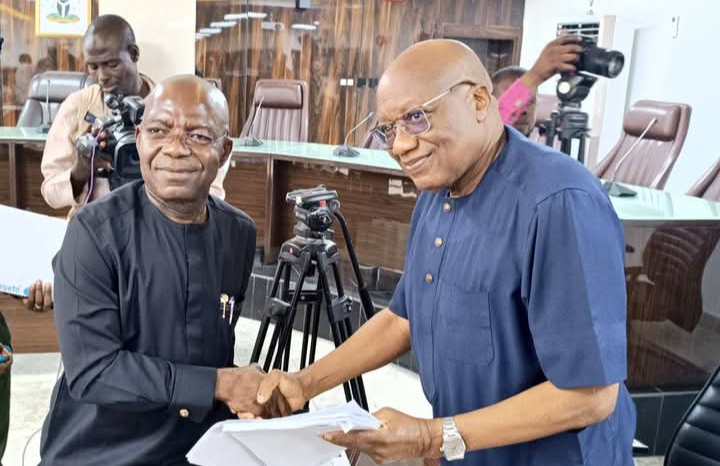
Mr. Sam Olumekun has taken over at the Independent National Electoral Commission (INEC) as Acting Chairman.
Olumekun is INEC’s National Commissioner in charge of Information and Voter Education.
He performed his first duties today, receiving a high-level delegation of the Labour Party (LP) at the Commission’s headquarters in Abuja with other National Commissioners in attendance.
The delegation was led by Abia State Governor Dr. Alex Otti, who visited the Commission to discuss key developments within the Labour Party.
It was gathered that both parties engaged in discussions centered on enhancing collaboration and reinforcing democratic values.
During the visit, Governor Otti formally presented a Certified True Copy of the recent Supreme Court judgment concerning the party’s leadership.
He noted that the meeting was aimed at fostering clarity, mutual understanding, and institutional alignment regarding the Labour Party’s current structure.
Mr. Olumekun, the Acting INEC Chairman, reaffirmed the Commission’s unwavering commitment to neutrality, transparency, and the rule of law in the discharge of its constitutional responsibilities.
Recall that a viral WhatsApp message had indicated that Prof. Mahmood was sacked by President Bola Tinubu and replaced with one Prof. Bashiru Olamilekan.
“INEC Chairman Prof. Mahmud Yakubu has been replaced with Prof. Bashiru Olamilekan by President Tinubu,” the message, which had no attribution, read. However, both INEC and the Presidency debunked the widespread report.
Yakubu, who is rounding off his second tenure in office, is expected to exit the system towards the end of this year.
The process of appointing an INEC chairman is the President nominating a candidate and forwarding his particulars to the Department of State Services (DSS) for profiling.
After such screening, the President, thereafter, takes the name to the National Council of State for its advisory review.
Based on the outcome, the President sends the name to the Senate for screening and confirmation.
News
Crude oil prices slide further, now selling below $57

Crude oil prices have dropped below $57, following a previous rate of $59.78.
This decline coincides with the imposition of tariffs on several countries by US President Donald Trump.
A report from West Texas Intermediate attributes this price slump to consistent 6% reductions observed last week.
JPMorgan Chase & Co has warned that these tariffs could likely push both the US and global economies into a recession this year.
The financial institution explained that the tariffs, set to take effect this week, are expected to have widespread economic repercussions.
Market analysts and the business community have expressed concerns about the negative implications of these measures, predicting a slowdown in economic activities and a subsequent decline in oil demand.
-
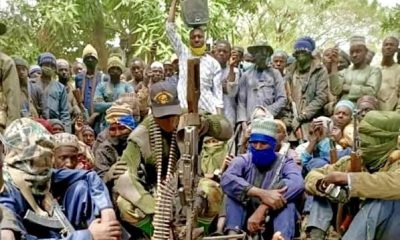
 News11 hours ago
News11 hours agoBanditry:” I was chained for 32days while in their den, killed my wife as I watch-Nat’l Assembly DD narrates experience
-

 News7 hours ago
News7 hours agoPolice Inspector Slumps, Dies While Celebrating After Arsenal Wallop Real Madrid 3-0
-

 News12 hours ago
News12 hours agoUS revokes more than 500 foreign student visas
-

 News19 hours ago
News19 hours agoBandits have seized control of 64 communities in Plateau – Gov Muftwang
-

 News14 hours ago
News14 hours agoIbas picks administrators for 23 Rivers LGs(SEE list)
-

 Economy18 hours ago
Economy18 hours agoMobile Money transactions hit $1.68trn in one year
-
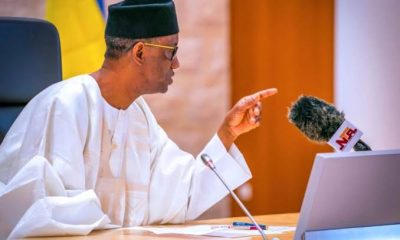
 News19 hours ago
News19 hours agoRibadu warns against ransom payment to terrorists, kidnappers, others
-

 News6 hours ago
News6 hours agoSAD! APC lawmaker dies while asleep





